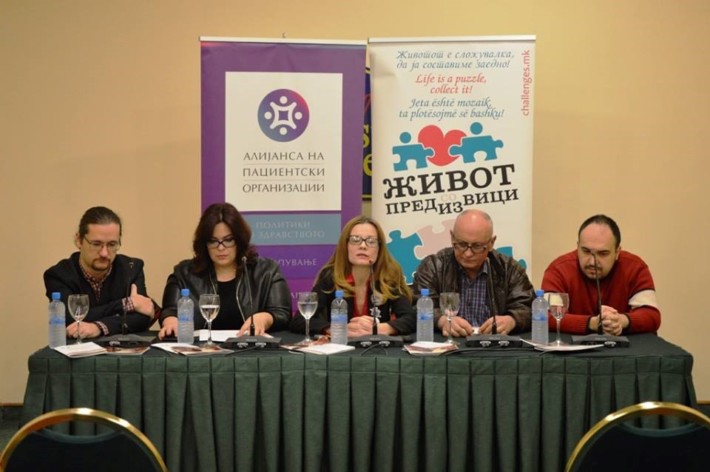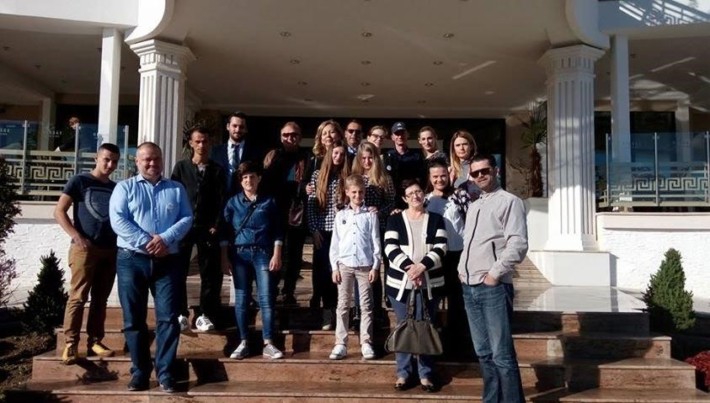The Citizen Association for Rare Diseases “Life with Challenges” organized a round table on the topic of rare cancers in Macedonia at Best Western Hotel in Skopje on October, 28th , 2016. This activity was about raising the institutional and public awareness regarding the inaccessibility to treatment for patients suffering from rare forms of cancer for which at the moment no therapy is procured neither through the FHIM nor through the rare disease programme of the Ministry of Health nor through the oncology and haematology clinics.
One of these rare cancers is the Myelodysplastic Syndrome and the day of MDS is marked in the month of October. One MDS patient is already receiving treatment through donation and another one received a similar donation in order to stabilize the state before starting bone marrow transplantation. There are different types of MDS and they fall into the rare disease group and there are the so called orphan drugs for their treatment. Unfortunately, at the moment we do not have precise information about the number of patients in need of treatment because of the different classification of MDS, however, the probability is that around ten patients need innovative therapy which will suppress the disease progress and improve patients’ lives.
Also there are many other different types of rare cancers such as: multiple myeloma, malign myeloma, gastrointestinal stromal tumors, gastroenteropancreatic neuroendocrine tumors, acute myeloma leukemia, angiosarcoma, neuroblastoma and many others; some of these have been publicized as rare in the Rare Disease Programme back in 2009, yet today they are not included in the Rare Disease Programme. We believe that they should not be discriminated as such and that these patients should receive the necessary treatment as they in fact do so in our neighbouring countries such as: Bulgaria, Croatia, Slovenia, Montenegro and Serbia made progress in this area.
Statement Vesna Aleksovska, President of “Life with Challenges”
“Rare diseases were invisible for a very long time in Macedonia. Since 2015 and the commencement of the Rare Disease Registry and the increased finances in the Rare Disease programme finally offer 13 diagnosis, that is 150 patients have received treatment. Until then these patients did not receive any type of medication and were left to their own means. Unfortunately, the patients with rare forms of cancer who are at the haematology clinic and oncology clinic still do not receive the necessary medicines. As a patients’ association we believe that there is discrimination towards these patients because they are faced with a rare disease and should be provided with medicines that will prolong their life, as well as improve their quality of life. One of these rare cancers is myelodysplastic syndrome (MDS) which is marked in October and for which we have created a brochure aimed at patients facing with this disease. One patient from Macedonia with MDS already receives the necessary treatment through a donation. We believe that treatment should be provided for all patients with rare cancers who are registered at the clinics. Unfortunately we do not have the exact number at the moment, but such diagnosis are rare and can be found at the Orphanet list; and at the moment this is one of the criteria for procurement of medicines for rare diseases. The criteria of 20 patients per diagnosis is discriminatory and as an Association and Alliance for rare diseases we reacted to the number 20 because we fear that the number is very limiting and there is uncertainty what will happen when the 21st patient is registered. We appeal for the rare disease programme to additionally expand financially, that is to say, for the amount that had been promised at the beginning (twice more than the present amount of 3 million euros) so that more patients receive the necessary medicines. Innovative medicines used in the world should be used in Macedonia in order to prolong and improve the patients’ lives.
Statement by patient with MDS –Dragi Lazevski
“In September I felt as if without energy or fitness, after all the tests the diagnosis of megaloblastic anaemia was confirmed in November. I was in dire financial situation and unable to provide the necessary medicines. Fortunately through Doctor Irina from haematology, whom I am deeply grateful for all her endeavours and those of the nurses and staff at the haematology clinic, I received treatment through donation from the company Celgene. After the treatment I felt wonderful and I can work and spend time with my family and do everything that I did before the disease. I must say that is important that innovative therapy should be available to al patients in order to have good quality of life and to prolong their life. No family alone can afford to provide treatment. Financially it is terribly difficult.”
Statement – Biba Dodeva, President APO
“In this pre-election times citizens need more than slogans. Therefore I publicly call upon all public institutions, present and future government, present and future health managers, I call upon the politicians and all those which our health depends on to put cancer as a priority in the health programmes and to understand the necessity of URGENT implementation of the National Strategy for Controlling Cancer in Macedonia that will enable and engender joint detection of problems and a comprehensive approach for surpassing them and resolving them.
Statement- Davor Duboka, Executive Director of the National Rare Diseases Organisation of Serbia
“I would like to point out the importance of what has been happening in Serbia recently, namely the HIF is already in negotiations with the pharmaceutical companies to create a priority list of innovative medicines that will be procured through a special fund in order to help patients facing difficult diseases, not only rare disease, but also cancer and other diseases requiring innovative therapies. In Serbia all the associations have come together in our demands for innovative medicines and we have finally reached and understanding from the institutions for the needs of the patients. For the time being 20 new medicines will be procured through the list of priority innovative medicines.”
Statement – Borislav Gjuric, President of the Rare Disease Association in Bosni and Herzegovina
“Bosnia and Herzegovina are unfortunately in a bad political situation because of all the problems we were facing in the past and have been facing ever since. The separation into cantons is very complicated and in some regions the situation with medicines is very good while in others it is devastating. Macedonia has a simpler political system and it is really incomprehensible why there is not a solution for the cancer patients yet. Personally I think it is literally manslaughter not to provide medicines for a patient whose life could be spared. It is not manslaughter just to kill someone. Health is a basic human right and no citizen should be deprived of it. All countries in the region make efforts to improve the quality of life of patients; we collaborate with all the associations and support regionally each other and we will not give up from the basic human right of life – health. We cooperate with institutions and media as well… one by one we might be few, but together we are many and together our voice is stronger and reaches further.”






